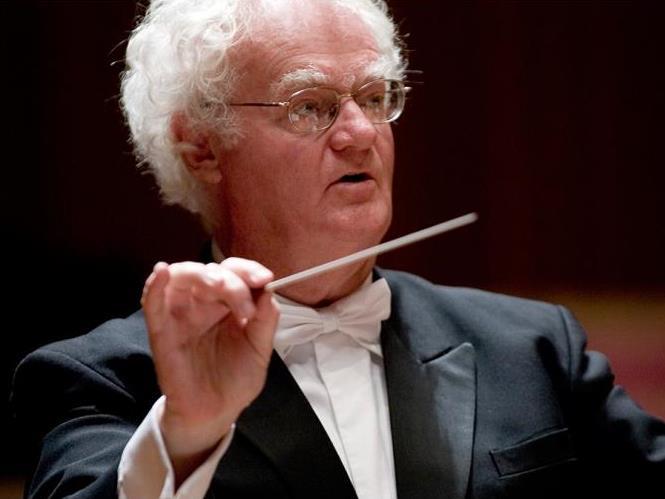Conductor Richard Gill. Photo via www.mso.com.au
It is no surprise that the Ears Wide Open series have become a popular annual event for the Melbourne Symphony Orchestra. With Richard Gill at the helm, the first in a triplet of concerts, Beethoven — incidental music to Egmont provided an insightful and passionate glimpse into a gifted composers work and the intricacies of a live orchestra.
The evening sun streamed through the distinct honeycombed windows of the Melbourne Recital Centre. The foyer hummed as the mostly silvered heads ordered their tea, biscuits and sparkling wine and sipped at them quickly.
You cannot take your drinks into the theatre itself unlike Hamer Hall (understandable but a shame nonetheless), but unlike that vast velveted space, the MRC, although just as cavernous, feels intimate even when you’re sitting up the back.
This was my first experience of an Ears Wide Open concert; a series designed to explore a piece or selection of music with the help of the ever-charismatic Richard Gill and members of the MSO.
I know Richard Gill from the ABC’s Spicks and Specks as a funny and intelligent opera man. I had high hopes for the concert. They were exceeded. Wearing what is sometimes known as a Madonna microphone, Gill approached the score with charm and passion.
‘I think this piece is extraordinary,’ he announced, ‘but just because I think it’s extraordinary doesn’t mean you will;’ then adding, ‘You’d be wrong of course.’
Clearly smitten with Beethoven, Gill took us through the music piece by piece, addressing the audience directly before turning back to conduct the orchestra. Throughout the night he entertained us with his knowledge and humour, while gesturing wildly, imitating instruments, and occasionally leaping to the piano to play for us himself. It was hard not to be swept up in this enthusiasm.
The MSO were their usual exceptional selves, keeping up magnificently with Gill as he took them to different bars all over the music. Starting and stopping them, he silenced some instruments, allowing others to shine through.
The flutes and bassoons showed us how Beethoven allowed sustained wind instruments to lend colour. The first violins showed his innovative use of the motifs, the violas and the cello’s his use of rests, and the unusually matched trumpet and violins for dramatic effect. The trumpets giving the strings brilliance, the strings giving the trumpets warmth.
It was incisive as the workings of not just the music, but an orchestra as a whole entity. How each instrument affects another so that what you have is this fullness of colour, drama and melody. Beethoven, we were shown definitively, was a gifted master ahead of his time.
Gill admits this music ‘changed his life’ when he first heard it on the radio as a boy of 12. His passion shone through. He has a unique ability to be entertaining while translating what can seem like a jargon-filled, impenetrable world to a general audience. I was won over. I feel fortunate to have been part of such an event.
Rating: 5 stars out of 5
Ears Wide Open Concert One
Melbourne Symphony Orchestra
Beethoven – Egmont: Incidental Music, op. 84
Richard Gill – Conductor/host
Elisabeth Murdoch Hall, Melbourne Recital Centre
3 March 2015
Additional concerts in this series:
Ears Wide Open Series Concert Two
Copland – Appalachian Spring
Elisabeth Murdoch Hall, 14 July
Ears Wide Open Series Concert Three
Tchaikovsky – Serenade for Strings
Elisabeth Murdoch Hall, 27 October





